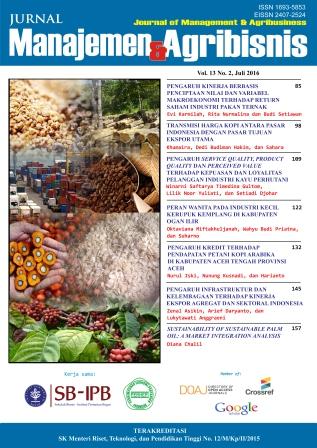SUSTAINABILITY OF SUSTAINABLE PALM OIL: A MARKET INTEGRATION ANALYSIS
Abstract
Crude Palm Oil (CPO) is the biggest consumed vegetable oil in the world. The increase in CPO production raises concern on the environmental impact even outside the producing countries. As a response to this matter, the EU has made a requirement to only import certified CPO (CSPO). India and China, the two biggest importers in the world, are less restrictive to the environmental issues, and their demands are more influenced by CPO price levels. These countries are the main export markets for Indonesia and Malaysia, the two biggest CPO exporters in the world. This research using monthly price data from the Netherlands, Germany, Italy, EU28, India, China, Indonesia and Malaysia. Market integrations are tested with Cointegration Test, Vector Error Correction Model and Seemingly Unrelated Regression. The results show that these markets are integrated, but European countries are unlikely to lead the price movement. Therefore, the concern on sustainable certification from the European countries still slowly spreads to other main importers, resulting in low absorption of CSPO.
Keywords: market integration; sustainable palm oil; seemingly unrelated regression; vector Error correction model
Keywords: market integration; sustainable palm oil; seemingly unrelated regression; vector Error correction model
Authors
ChalilD. (2016). SUSTAINABILITY OF SUSTAINABLE PALM OIL: A MARKET INTEGRATION ANALYSIS. Jurnal Manajemen Dan Agribisnis, 13(2), 157. https://doi.org/10.17358/jma.13.2.157
Authors who publish with this journal agree to the following terms:
- Authors retain copyright and grant the journal right of first publication with the work simultaneously licensed under a Creative Commons Attribution License that allows others to share the work with an acknowledgement of the work's authorship and initial publication in this journal.
- Authors are able to enter into separate, additional contractual arrangements for the non-exclusive distribution of the journal's published version of the work (e.g., post it to an institutional repository or publish it in a book), with an acknowledgement of its initial publication in this journal.
- Authors are permitted and encouraged to post their work online (e.g., in institutional repositories or on their website) prior to and during the submission process, as it can lead to productive exchanges, as well as earlier and greater citation of published work (See The Effect of Open Access).

